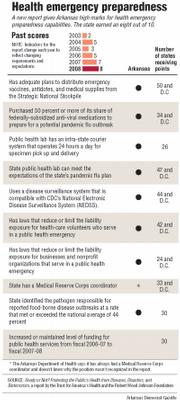LITTLE ROCK — Arkansas is better prepared to protect the public from diseases and disasters than it was in previous years, earning a score of eight out of 10 in a report issued Tuesday by two nonprofit groups focused on public health.
The state lost two points because of a dip in the Arkansas Department of Health's funding and because the federal government has no record of a coordinator for a medical outreach program, the report by the Trust for America's Health and the Robert Wood Johnson Foundation said.
Overall, Arkansas is in "pretty good shape" compared with the other 49 states andWashington, D.C., Jeffrey Levi, executive director of the Trust for America's Health, said.
He is an author of the report, Ready or Not? Protecting the Public's Health from Diseases, Disasters, and Bioterrorism, which Levi says is the best available measure of states' ability to handle an event such as a bird flu outbreak or a terroristic act.
Arkansas has scored anywhere from a two to a seven since 2003, the first year such a report was released.
The report found that Arkansas' funding of public health services dropped .2 percent from fiscal year 2006-07 to 2007-08. State health department officials downplayed the decrease, saying it had no practical impact on services because reserve funds and federal grants were tapped.
Plus, the demerit for having no recognized state coordinator to oversee the Medical Reserve Corps is only a reporting error, as the state has always had someone in place to oversee that effort, state Health Department officials said.
"I am very proud of the work the department and its partners have done in preparedness and response," said Paul Halverson, head of the Arkansas Department of Health. "We've made great strides. Even an eight is a very, very good score."
Some key improvements in the state include having:
A disease tracking system to collect and monitor data over the Internet.
An adequate plan for distributing emergency vaccines from a national stockpile.
Adequate public health lab capacity.
A pandemic flu preparedness plan.
Arkansas is one of 10 states to earn eight points. More than half of the states and Washington, D.C., scored worse, earning seven or fewer points, while Louisiana, New Hampshire, North Carolina, Virginia and Wisconsin got all 10 points.
Examples of major emergency public health threats include blast injuries, foodborne diseases, natural disasters, pandemic flu and terrorism such as the spread of anthrax, poisonous gases or deliberate introduction of plant or animal diseases.
Dr. William Mason, who oversees the Department of Health's preparedness and response branch, noted that Arkansas is repeatedly tested on its ability to deal with health emergencies and has done well in recent years. He pointed to the state's response to tornado outbreaks and the flood of hurricane evacuees from other states who have sought refuge in Arkansas.
"Arkansas knows exactly what it can do, and we've doneit," he said, noting that local medical providers geared up to screen and treat those evacuees. He said the coordinator of the Medical Reserve Corps was integral in those responses.
The report says the country has grown "complacent" about public health emergency preparedness since the Sept. 11, 2001, attacks and the devastating Gulf Coast hurricanes. Federal funding for state and local preparedness was down more than 25 percent in the past year compared with 2005 levels, the report found.
"State and local governments will not be able to make up for the shortfalls in the current economic climate," the report says.
Still, there have been gains. More states than ever - 44 - have sufficient lab capabilities to test for biological threats,and every state and Washington, D.C., has plans for a pandemic flu. Also, every state has increased or maintained senior citizens' flu vaccination rates.
Halverson said Arkansas set a record in giving out flu shots this year - 124,172 - which is a good test for how it would handle mass distribution of other medicine in the event of a disaster.
Arkansas, Pages 11, 15 on 12/10/2008
